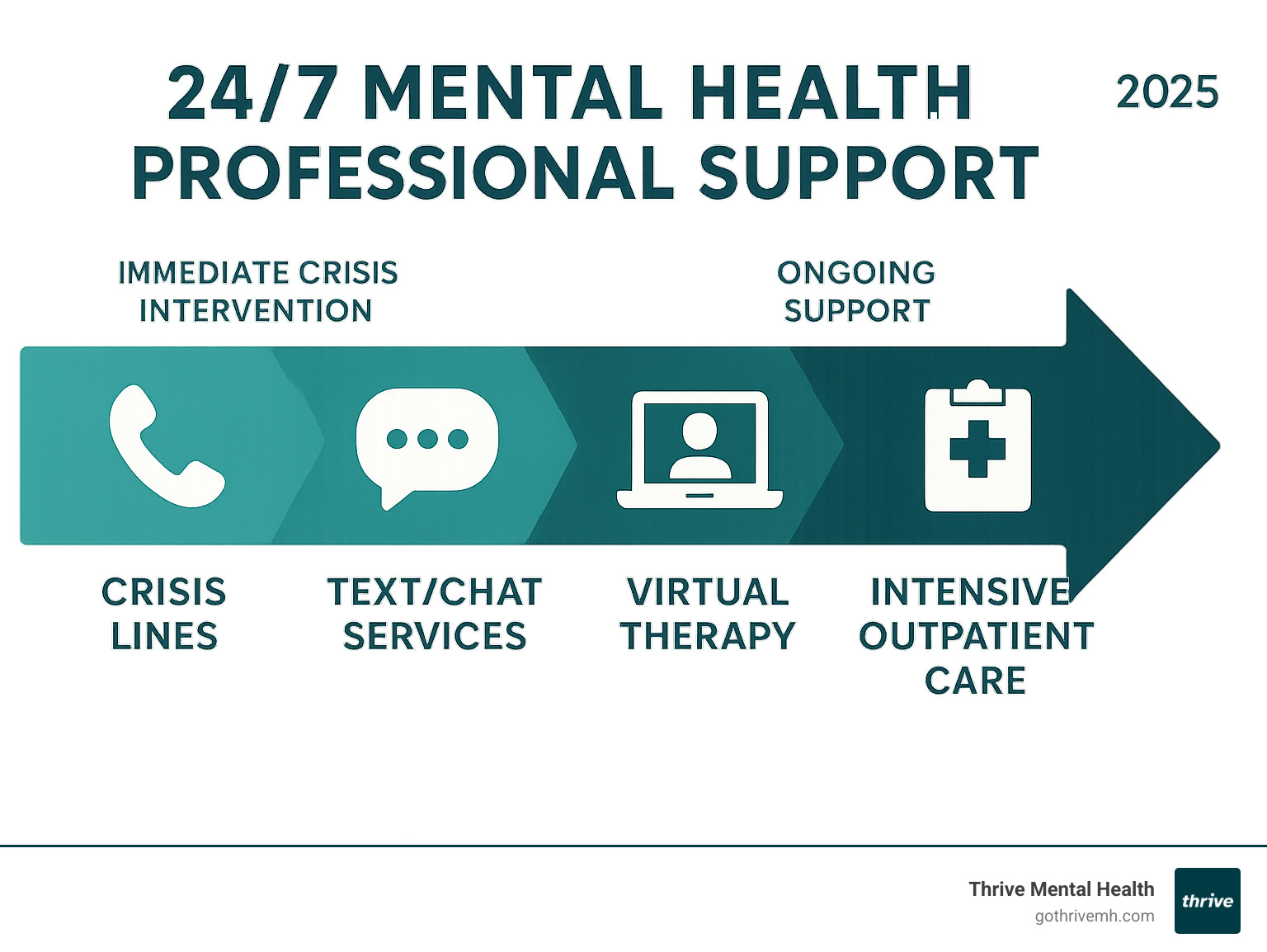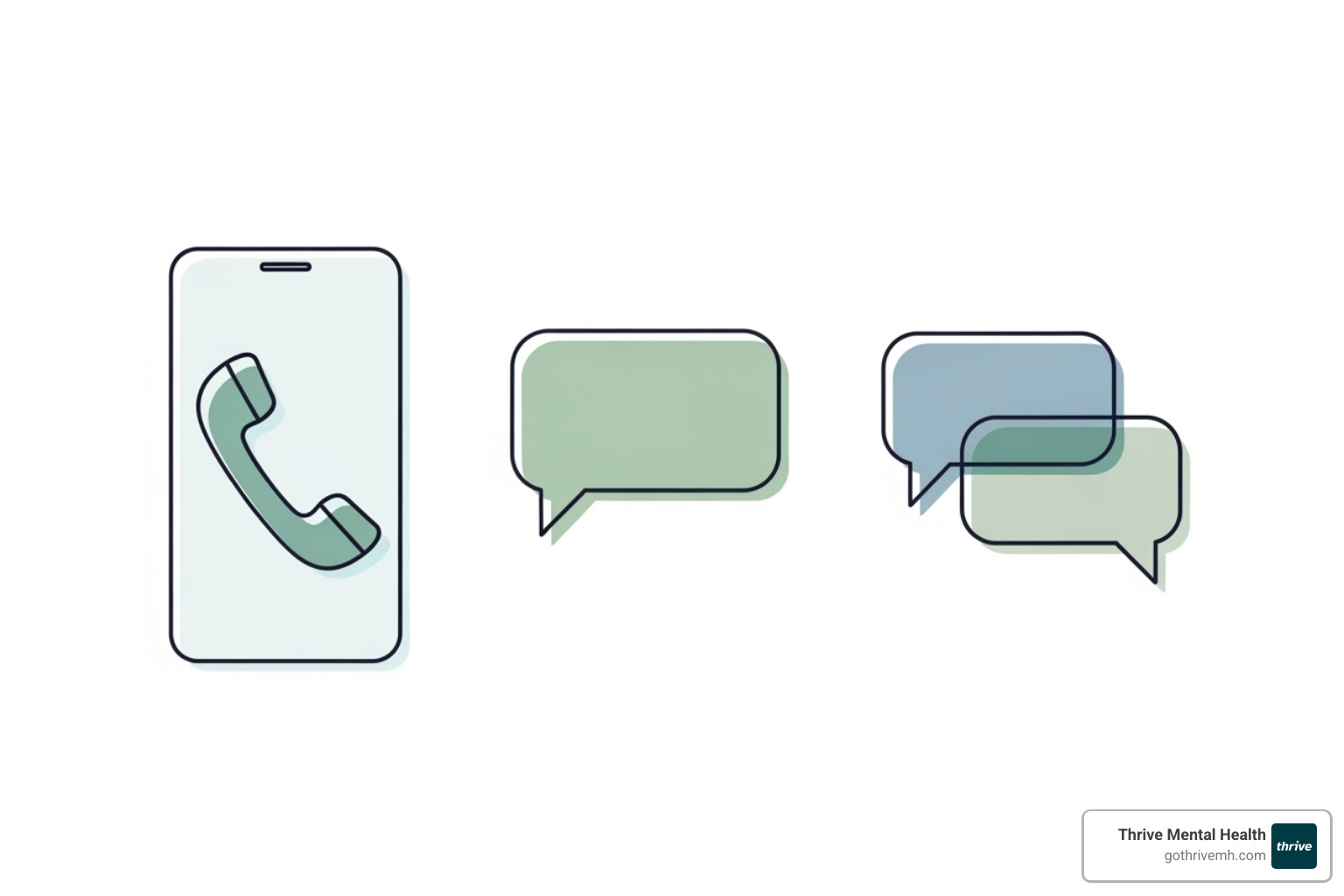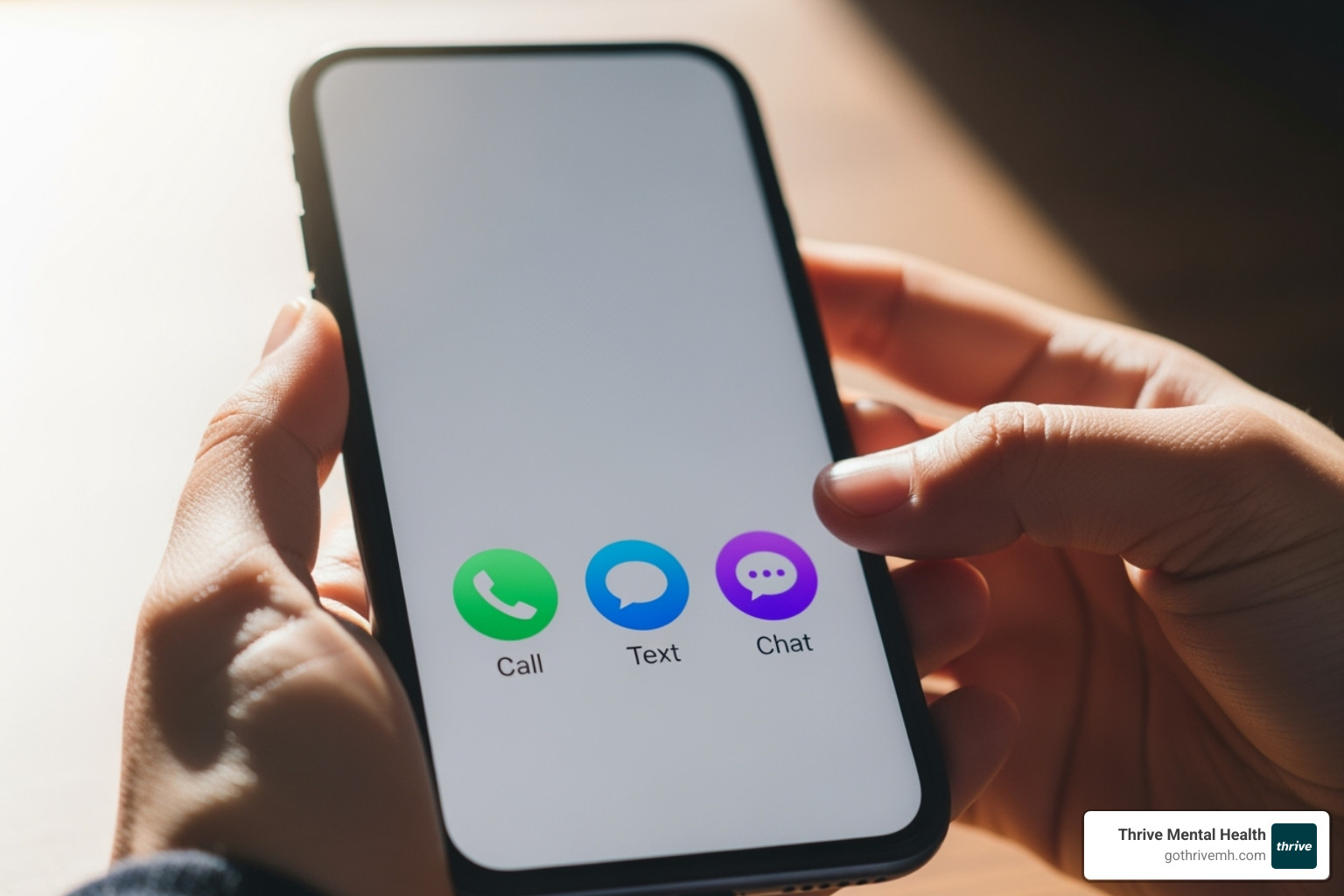Crisis Averted! How to Access Mental Health Support Around the Clock

Why Immediate Support Matters
24/7 mental health professional support is available when you need it most – whether you’re facing a crisis at 3 AM or struggling with overwhelming anxiety during a busy workday. Mental health challenges don’t follow a 9-to-5 schedule, and neither should your access to help.
Immediate Access Options:
- Crisis Lines: Call 988 for suicide/crisis support or text HOME to 741741
- Warm Lines: Non-crisis emotional support and listening
- Virtual Therapy: On-demand sessions with licensed professionals
- Text/Chat Services: Confidential support via messaging platforms
Statistics highlight a critical truth: when someone is struggling, immediate access to professional support can be life-changing. You no longer need to wait weeks for an appointment or struggle alone. Whether you’re dealing with late-night anxiety, weekend depression, or an unexpected crisis, help is at your fingertips.
Timely intervention is critical to reducing the lifelong burden of mental illness. The sooner you connect with support, the more tools you’ll have to manage challenges and build resilience.
I’m Nate Raine, CEO of Thrive Mental Health. I’ve dedicated my career to expanding access to behavioral health care, and my experience has shown me how 24/7 mental health professional support transforms lives and prevents small struggles from becoming major crises.

What is 24/7 Mental Health Professional Support?
When we talk about 24/7 mental health professional support, we mean a spectrum of services providing immediate, confidential help at any time. Mental health challenges don’t keep business hours, and neither should your access to support. Whether you’re having a panic attack, experiencing suicidal thoughts, or just feel overwhelmed, a trained individual is ready to assist.
These services include:
- Crisis Hotlines: For immediate, life-threatening situations, offering de-escalation and safety planning.
- Warm Lines: For non-crisis support, providing a listening ear for daily stressors or loneliness.
- Text and Chat Services: A discreet option for real-time support via messaging.
- Virtual Therapy Platforms: Flexible scheduling and messaging for ongoing professional guidance.
Confidentiality and privacy are cornerstones of these services. Your conversations are kept private under strict ethical and legal guidelines, creating a safe space to share openly. Many vital services, like crisis hotlines and warm lines, are free, funded by governments or non-profits. Other services, like virtual therapy, may have costs but often accept insurance or offer sliding scale fees. Our goal at Thrive Mental Health is to make professional care accessible, as the benefits of utilizing mental health services are immense.

Who Provides the Support?
The professionals you connect with depend on the service:
- Licensed Professionals: Many services are staffed by licensed therapists, psychologists, social workers, and psychiatric nurses with advanced degrees and training in evidence-based support.
- Trained Volunteers: Crisis services like Crisis Text Line rely on rigorously trained volunteers skilled in active listening, empathy, and crisis intervention. They provide immediate emotional support but not formal therapy.
- Peer Supporters: Some warm lines are run by individuals with lived experience of mental health challenges, offering empathy and hope from a shared perspective.
- Multidisciplinary Teams: Comprehensive services often use teams of different specialists to provide well-rounded support.
What Concerns Can Be Addressed?
The scope of concerns is broad, and no issue is too small if it’s impacting your well-being. Common concerns addressed include:
- Anxiety and panic attacks
- Depression and low mood
- Suicidal thoughts
- Stress from work or life changes
- Trauma and PTSD
- Grief and loss
- Substance use and addiction
- Relationship issues
- Self-harm
- Eating disorders
These services offer crisis support, mental health screening, information, and coping strategies. They can also provide referrals to local services. For more details, explore our comprehensive guide to behavioral health services.
How to Access Help: Your Guide to Immediate Support Channels
When you’re struggling, accessing help should be simple. 24/7 mental health professional support offers multiple ways to connect, meeting you where you are. Whether you prefer to talk, text, or chat, these services are designed for immediate connection without appointments, referrals, or often any cost.

By Phone: National and Local Helplines
Hearing a supportive voice can be powerful. Phone helplines connect you instantly with a trained professional ready to listen without judgment.
During the call, the professional will gently guide the conversation to understand your situation. They are skilled in de-escalation for crisis moments and can connect you to local resources for ongoing support. Lines like the 988 Suicide & Crisis Lifeline operate 24/7, every day of the year, ensuring someone is always there to answer. These calls are typically toll-free and confidential. As the 988 Lifeline notes, you can expect to talk to someone who will listen and help you through your challenges.
By Text or Chat: Confidential Support at Your Fingertips
For those who prefer not to speak aloud, text and chat services offer a discreet and anonymous way to get help. You can reach out from anywhere without being overheard and take your time to formulate your thoughts.
To use a service like Crisis Text Line, you text a keyword (e.g., “HOME” to 741741) and are connected with a trained crisis counselor. The goal is to help you move “from a hot moment to a cool calm” by providing emotional support and coping strategies. At Thrive Mental Health, we know having multiple ways to get emotional support online is crucial.
Finding the Right 24/7 Mental Health Professional Support for You
Specialized support is available for many communities:
- Veterans and service members can reach the Veterans Crisis Line by calling 988 and pressing 1, or texting 838255. The VAC Assistance Service (1-800-268-7708) serves Canadian veterans and their families.
- LGBTQ+ youth can contact The Trevor Lifeline at 1-866-488-7386. The 988 Lifeline also offers specialized support for LGBTQ+ people under 25 by calling 988 and pressing 3.
- Indigenous communities in Canada can use the Hope for Wellness Help Line at 1-855-242-3310, which offers support in multiple Indigenous languages.
- Those with eating disorders can call the National Eating Disorder Association Helpline at 1-800-931-2237.
- For substance abuse concerns, the SAMHSA National Helpline at 1-800-662-HELP offers free, confidential support.
Navigating Your First Call: What to Expect and How to Prepare
Making the first call for 24/7 mental health professional support can be nerve-wracking, and that’s completely normal. Know that the person who answers is trained to create a non-judgmental space for you to share what’s on your mind. Their goal isn’t to fix everything at once, but to listen, understand, and help you feel less alone.

There’s no right or wrong way to start. The listener will practice active listening, reflecting what you say and asking gentle questions. If you’re in crisis, they may conduct a safety assessment to ensure you’re protected. It’s also okay to be silent; they will wait patiently. These conversations can provide immediate coping strategies and connect you to longer-term options like virtual therapy, which offers a convenient and effective approach to counseling.
Your Privacy is a Priority
Your privacy is legally protected. These services operate under strict confidentiality policies. Most offer anonymity options, and text/chat platforms use secure platforms to protect your conversations. The only exception to confidentiality is rare and occurs only when there’s an imminent risk of harm to you or someone else, or in cases of suspected child or elder abuse. In these situations, professionals are legally required to act to ensure safety, and they will typically explain what they need to do.
What if I Don’t Know What to Say?
It’s common to not know how to begin. The most honest approach is often the best. You can start with simple phrases like:
- “I’m not sure where to start.”
- “I’m feeling overwhelmed.”
- “I just need to talk to someone.”
- “I’m having thoughts that are scaring me.”
Even saying, “I’m finding it hard to talk right now,” is perfectly fine. The supporter is skilled at guiding the conversation at your pace. The most important thing is that you reached out—that action alone shows incredible strength.
Beyond the Crisis: When to Seek Long-Term Care
While 24/7 mental health professional support is a vital lifeline for immediate relief, it’s designed to stabilize you in the moment, not provide the ongoing care that builds lasting wellness. Think of it as a mental health emergency room.
The difference between crisis intervention and ongoing therapy is key. Crisis support is for the right now. Ongoing therapy is a longer journey with a consistent therapist who helps you understand the roots of your struggles and build lasting coping strategies.
So, when is it time for more? Signs you may need more support include frequently relying on crisis lines, experiencing recurring crises, or dealing with chronic symptoms of anxiety or depression that interfere with your life. A desire for deeper self-understanding or feeling like you’re just surviving, not thriving, are also valid reasons to seek more comprehensive care. Understanding when to consult a behavioral health clinic is the next step.
Stepping Up Your Support: Individual Therapy
Individual therapy provides consistency. Weekly sessions with the same therapist allow you to build a therapeutic relationship—a safe space to explore difficult emotions and challenge unhelpful thought patterns. Your therapist gets to know your story and can track your progress over time. Quality therapy is built on evidence-based practices like Cognitive Behavioral Therapy (CBT), which helps reshape the thoughts that keep you stuck. When you choose the right individual online counseling service for your needs, you can create lasting change.
When You Need More Than Weekly Sessions: Intensive Programs
For significant challenges that require more structure than weekly therapy, intensive programs can be transformative.
- Intensive Outpatient Programs (IOP) offer several hours of therapy multiple days a week, allowing you to live at home and maintain daily responsibilities.
- Partial Hospitalization Programs (PHP) provide an even higher level of care, with therapeutic services for most of the day, five days a week.
These programs offer a comprehensive approach, combining group therapy, individual counseling, and skill-building sessions. Group therapy reduces isolation, while skill-building provides practical tools for managing emotions and preventing relapse. Virtual intensive outpatient programs are revolutionizing care by making this support accessible from anywhere. At Thrive Mental Health, we’ve seen how these flexible, robust programs help adults and young professionals build lasting wellness.
Frequently Asked Questions about 24/7 Mental Health Support
It’s natural to have questions before reaching out for 24/7 mental health professional support. Here are answers to some common concerns.
Is 24/7 mental health support truly confidential?
Yes, confidentiality is a cornerstone of these services. Your conversations are protected by strict privacy policies and professional ethics. The only exception is if there is an immediate risk of serious harm to yourself or others. In these rare cases, professionals are legally required to take action to ensure safety, and they will typically inform you of the steps they need to take.
Can I use these services to get help for a friend or family member?
Absolutely. You don’t have to be in crisis yourself. You can call to get guidance on how to support your loved one, learn about resources available to them, and practice how to approach difficult conversations. They can help you be a supportive ally.
What if I’m not in a life-threatening crisis?
You don’t need to be in a life-threatening crisis to deserve help. Many people hesitate because they feel their problems aren’t “serious enough,” but this isn’t true. Services like warm lines are designed for non-crisis situations where you might be feeling lonely, stressed, or just need to talk. Addressing concerns early can prevent them from becoming overwhelming. No issue is too small if it’s affecting your well-being.
Conclusion: Your Path to Wellness Starts With a Single Step
Reaching out for help is not a sign of weakness—it’s one of the bravest things you can do. When you’re struggling, help is always available, and you are never truly alone.
The landscape of mental health support has transformed. Whether you’re facing a crisis at 2 AM, dealing with overwhelming anxiety, or simply need someone to listen, 24/7 mental health professional support is there for you. The method doesn’t matter—text, chat, or call—what matters is that you reach out.
Sometimes, immediate support reveals the need for more structured, ongoing care. If you find yourself needing crisis support repeatedly or dealing with persistent symptoms, it may be time for a deeper level of care.
For adults and young professionals ready for that next step, Thrive Mental Health provides flexible programs to build lasting wellness. Our virtual and in-person intensive outpatient (IOP) and partial hospitalization (PHP) programs offer the structured, expert-led care you need while fitting into your life. This is about building the skills and resilience for a healthier future.
Your well-being matters. Take the next step in your mental health journey with remote mental health support. We’re here for you.